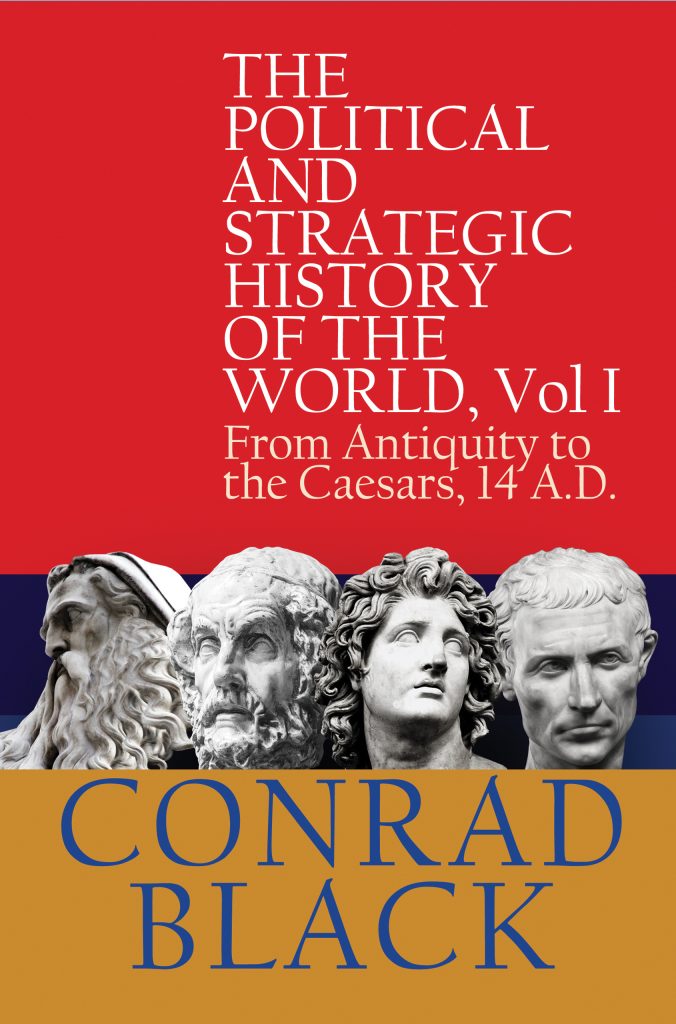
Nigel Jones writes in the Spectator Australia:
George Orwell has a story that when Sir Walter Raleigh published the first volume of his projected history of the world while in prison, he witnessed a brawl outside his rooms in the Bloody Tower which resulted in the death of a workman. Despite diligent enquiries, Raleigh was unable to discover the cause of the quarrel. Reasoning that if he could not even ascertain the facts behind what he had observed he could hardly accurately report what had happened in distant lands centuries earlier, he burned his notes for the second volume and abandoned the entire project.
No such doubts assail the 79-year-old Conrad Black, sometime proprietor of The Spectator, who, like Raleigh, has written the first of a projected three-volume global history. The book embraces those civilisations and empires of which there exist written or archaeological records from Old Testament times until the death of the first Roman emperor, Augustus.
Even eschewing (as Black does) social and cultural aspects in favour of political and military history, this is a vast undertaking. Any reader approaching this massive, closely printed volume must admire Black’s energy, erudition and ambition. Small wonder, then, that his historian friends including Andrew Roberts, Victor Davis Hanson and the late Henry Kissinger have heaped praise on him, even hailing him as the new Edward Gibbon. Black has certainly produced ‘another damn thick, square book’, as the Duke of Gloucester called the second volume of The Decline and Fall of the Roman Empire on its publication in 1781, but it is a very readable one.
Also like Gibbon, Black is not shy about inserting his opinions into his narrative. A proponent of the deeply unfashionable ‘great man’ view of history (apart from Cleopatra, very few women intrude on these pages); his heroes – Alexander the Great, Hannibal and Julius Caesar – are the real movers and shakers of the world, rather than impersonal socio-economic forces. So keen an admirer of Caesar is he that he positively deifies him with laurels – justifiably as a general in the Gallic and Pompeian wars, but less so as the would-be dictator of Rome.
Black certainly goes overboard in his dismissal of Caesar’s assassins as ‘a wretched gang of self-deluded backstabbers and cowards’ (what, all 60 of them?), who brutally did away with a figure who is made to sound like a cross between a saintly prison visitor and a Salvation Army general rather than the ruthless tyrant that he was. Nor does Black advance his case for Caesar as a liberal democrat ahead of his time by his contemptuous dismissal of the Republic that the conspirators thought they were defending. The book’s unfavourable comparisons between noble Brutus and thoughtful Cassius with the moronic thugs John Wilkes Booth and Lee Harvey Oswald (assassins of Lincoln and JFK) are absurd.
Black has an unfortunate tendency to dismiss as ‘the rabble’ all those who opposed his great men, thus exhibiting a lofty, Coriolanus-like conviction that only someone ready to wade through blood to slake his lust for power is fit for our consideration. His disdain extends even further: a chapter on ‘Assyria’s later warlords’ is helpfully subtitled: ‘Only for readers interested in repetitive wars of little lasting importance.’
Despite such caveats, the book is an astonishing achievement by any standards. Black appears to have mastered in minute detail the early history of Israel and the Jews, the Mesopotamian civilisations of Assyria and Babylon, as well as Egypt, Greece, Persia, Parthia and Rome. We have to accept on trust the sources for his more dogmatic assertions since, astonishingly for a book of this nature, there is no bibliography. He takes ancient estimates of, for example, the size of armies at face value rather than querying them in the light of new evidence.
There is also much blurring of the distinction between mythical and legendary figures, such as Hercules and Homer, and verifiable history as set down by the likes of Polybius. Though there are many maps, they are so small and faintly printed that the place names are often illegible.
This book is, above all, a history of western civilisation. Though Black includes sections on the early histories of India and China, and the religious figures of Buddha and Confucius, his chief interest lies in the cultures and military history of Greece and Rome, and the roots of Judeo-Christian society. But for the impact of Christ himself we must await the next volume.







